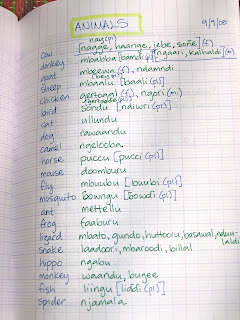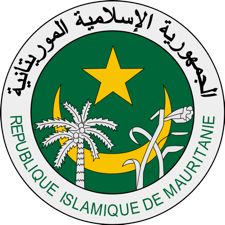 I live in a village where everyone's* mother tongue is Pulaar. Varieties of this language (under an umbrella called Fula) are spoken throughout West, Central, and East Africa by 25 million speakers. My strand is essentially understood in Mauritania, Senegal, and The Gambia.
I live in a village where everyone's* mother tongue is Pulaar. Varieties of this language (under an umbrella called Fula) are spoken throughout West, Central, and East Africa by 25 million speakers. My strand is essentially understood in Mauritania, Senegal, and The Gambia.[* = Everyone with the exception of the hakem, who is the first-in-command sovereign bigwig of Dar el Barka. Like the vast majority of political higher-ups in Mauritania, he is a Moor and thus speaks Hassaniya, a dialect of Arabic. From what I can tell he barely knows any Pulaar at all -- nevermind that, meanwhile, few of the villagers communicate in Hassaniya. But why on earth would one ever need to SPEAK with the people he governs? I digress.]
Everyone who has been to school also speaks the colonial language of French, to some degree. This is therefore my fallback when I can't get my point across in Pulaar; we both stumble along in a language neither of us particularly excels in, but it often gets the job done. By necessity, Pulaar frequently borrows words from French where the concept has not existed in traditional society -- terms relating to technology, medicine, commerce. Examples include: cell phone, battery, bank, school, bandage, store, bathroom, paved road, car, gun, alcohol, sweater, electricity, law, rent, clock, faucet, table, plate, vote.
As a perpetual student of linguistics, I am intrigued by the way our minds choose our words and conversely how language can shape our thoughts (psycholinguistics). Interesting finds in Pulaar:
- The word leydi means country, land, nation, ground, sand, and floor. So to ask people where they're from, you ask, "What is your sand?"
- The generic word for "medicine" is the same for "trees."
- Rather than having separate words for "sister" and "brother," there are only "older sibling" and "younger sibling" (each of which you can specify as male or female). Birth order is more important than gender.
- The same word is used for "to like" and "to want," thus rendering it hard to compliment your friend's possession without insinuating that you want to take it from him.
- "Airplane" is literally "flying boat."
- The word fesaade means "to be intelligent"; it is also used for "to be vaccinated."
 Pulaar lacks the nuances and complexity of English -- no subordinate clauses, no past perfect progressive -- but Pulaar speakers are so much more concise. They have single words that mean, for example: "to remember and say something during a meal," "to feel sand grains while chewing" (more common than I'd like), "a person with a lower lip smaller than the upper lip," "to leave one's husband's compound after a dispute," "to dig holes for sowing a second time," and the ever-useful "a death message broadcast on the radio" (I'm not really sure yet on the usage of that one).
Pulaar lacks the nuances and complexity of English -- no subordinate clauses, no past perfect progressive -- but Pulaar speakers are so much more concise. They have single words that mean, for example: "to remember and say something during a meal," "to feel sand grains while chewing" (more common than I'd like), "a person with a lower lip smaller than the upper lip," "to leave one's husband's compound after a dispute," "to dig holes for sowing a second time," and the ever-useful "a death message broadcast on the radio" (I'm not really sure yet on the usage of that one).Also, it is near impossible to make a statement in the future tense without adding the Arabic inshallah (or Pulaar's borrowed version so Allah jaɓi), meaning "if God wills it." When I say to my family that I'm going home to rest but I'll be back for dinner, they all murmur, "Inshallah, inshallah." In fact, in Pulaar "if" and "when" are the same word: "Every morning, if I wake up, I get dressed." I guess you never do know.
School was originally supposed to begin October 5th, but God didn't will it. Between the coup and Ramadan and lingering unresolved teachers' strikes, the start date is now "October 12th, inshallah." I've heard rumors we may not begin until November...


11 comments:
Oh dear, I suppose I need to go and find out what a "past perfect progressive" is...
Thanks, Julie, for the insights into life in Mauritania, and into language complexities!
You are in our hearts and prayers.
beautiful analysis. i'll meditate on this for a while...
Hi, I have the book you showed and find it very useful. Would any of your Pulaar-speaking friends like free copies of a paper in Pulaar? See http://soon.org.uk/fulani/free-papers.php
We mail them free of charge if specifically requested.
Thanks, Jane
Hi Aunt Julie!
Can I start school in october???
Love,
Hunter
Hi, Julie Ann,
Salaam aleikum!
Just read the latest entry and I can shed a little light on one of the items you mentioned: "a death message broadcast on the radio."
There is a nationally broadcast radio program in Mauritania during which people can send messages over the radio to their friends and relatives around the country. It has been on at the same time, same day of the week for years. People have to get the message to the radio station headquarters in Nouakchott, and then it is broadcast.
I never knew about this while I was living in Mauritania. I recently found out about it via en e-mail link that somebody sent me. There was a story about it on the radio -- BBC World, I think. In fact, I have been scouring my own e-mails to see if I could come up with the link, but so far I can't find it. If I do, I will send you an e-mail about it.
Hope you are eating lots of INNIWILLY food.
Masalaam,
Jay
Hey JA! I just want to commiserate the starting (or lack thereof) of school. I also am hanging my hopes for work more or less on the start of the school year and so far it's been Thursday, Monday, and I'll be seeing the teachers on Saturday. Maybe next Monday, si allah jabi, we'll start. I hope he jabis.
Dearest Julie,
Wow! Life is surely full of adventure, isn't it? I continue to pray for you, your life and your work there. God is "growing you" in a very special way..... no doubt with more big plans ahead. You are looking great and sounding (reading) well. Blessings!
Aunt Dot
You are so amazing. I selfishly miss you so much. thank you for writing your blog, which makes it feel like you're not so very far away.
come home! ok, well, save the world, and then come home. miss you tons! maybe when you get back you can just live with me again. ok?
I am very impressed Julie with your fula vocabulary not only as a native speaker but a fula writer and radio host. I haven't seen such an approach on the fula language for long time. If you need help interpreting any "bizarre/crazy" phenomena, I am just an email away.
Please let me know what I can do to help.
Oumar Ba
Pulaar Speaking Association
WPAT radio
oba_fl@yahoo.com
www.jamweli.org www.jamtan.com
Demba Astel
"The same word is used for"like" and to "want" thus rendering hard to compliment your friend's possession without insinuating that you want to take it from him/her"
Have you tried the word "Welimi"?In pulaar we say: Cakka maa ka ene welimi. The Word weli,mena "lakeble""tasty" and "Pleasant"
Post a Comment